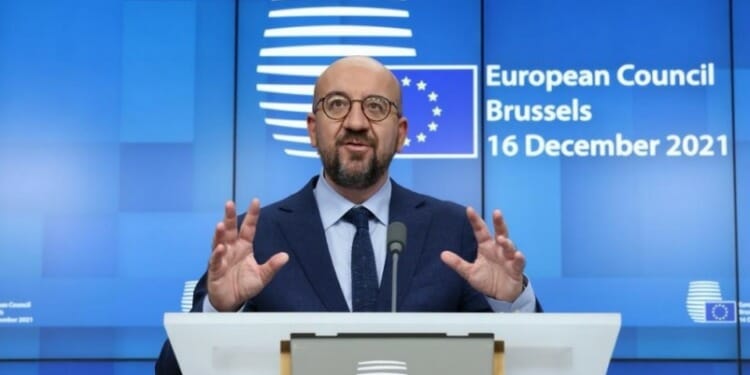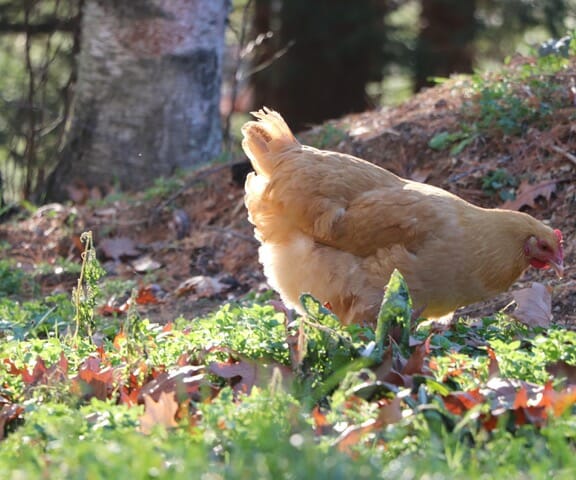In the last meeting of the European Council held this year on December 16, as shown in their report of the “conclusions” they have adopted, the leaders of the 27 members of the European Union faced a couple of major issues, the kind that threatens the fragile equilibrium of the Union:
(1) how to handle border traffic between EU members as the Omicron variant is spreading and is likely to cause more countries to go into lockdown this winter; and
(2) what policies to adopt against the current energy crisis driving up prices for both gas and electricity across Europe and alarming European businesses and families.
After 14 hours of negotiations, the European Council could reach no agreement on either front, despite the urgency to find some sort of solution. The only issue on which there was agreement was the one concerning the threat from Russia on the Ukraine border. At this point in time, it is reported that Putin has amassed 100,000 troops on the eastern border of Ukraine, prompting fears of an attack in early 2022. The build-up is undeniable and NATO has been warning about it for weeks.
EU-Russia relations: The only issue the European Council could agree on
The European Council made a request to Russia to “de-escalate tensions” on the Ukraine border and reiterated “its full support for Ukraine’s sovereignty and territorial integrity”. The Council added that “Any further military aggression against Ukraine will have massive consequences and severe cost in response, including restrictive measures coordinated with partners.”
It sounds good but there’s still a familiar problem lurking in the future: The 27, in fact, are not likely to easily agree on exactly what “restrictive measures” should be taken and European solidarity could be sorely tested in the coming months. Ukrainian President Volodymyr Zelenskiy would like to see preemptive punitive sanctions imposed on Russia – not a likely possibility according to European officials who see legal and political barriers.
Meanwhile, in a list handed this week to US envoy Assistant Secretary of State Karen Donfried on a visit to Moscow, Putin has demanded that Ukraine and Georgia be barred from joining NATO and called on NATO not to establish any new military base on the territory of the former Soviet states. The latter demand, in effect, could be interpreted as an attempt to stop NATO from deploying forces in former communist member states like Poland, the Czech Republic and the Baltic States.
The controversial Nord Stream 2 gas pipeline from Russia to Germany is clearly one main piece of leverage against Russia. But the pipeline still has to be opened – it is awaiting approval from Germany’s energy regulator that is in no hurry, indicating that full certification would not come in the first half of 2022.
Moreover, it is not clear whether it might ever be used as a sanction measure, as other countries besides Germany, including Austria, clamor for it to start delivering gas. It is a complicated issue as the new gas pipeline would transit downstream to Austria, Italy and the wider region of Eastern and Central Europe – thus putting Germany into the gas transit role that was once Ukraine’s monopoly. This means that Ukraine would suddenly be deprived of its transit fees and what was once a crucial strategic national security asset.
Yet, on the EU-Russia front, the EU appears to be far more compact than on other types of issues. Notable is the agreement that was reached by EU foreign affairs ministers on sanctioning the Russian mercenaries of the Wagner Group and that was integrated into the EU Council’s decisions.
The Wagner Group is an opaque Russian contractor company that allegedly recruits, trains and sends military operatives to conflict zones around the world. The EU Council, in support of the decision, said that these Wagner mercenaries “fuel violence, plunder natural resources and intimidate civilians in violation of international law, including international human rights law”. The group is involved in activities of “destabilization” and violation of human rights in Libya, Mali, Syria, and (of course) Ukraine.
Anti-Omicron Measures
On the first front of dissent, that of anti-Omicron measures, a controversy immediately exploded in the European Council over the policy adopted by Italy to call for additional restrictions to the EU Covid digital certificate. The decision of the Italian government to impose on travelers coming into the country a Covid test requirement in addition to the Green pass triggered the discontent of various EU countries, but above all that of the EU Commission.
Ursula von der Leyen who leads the Commission was annoyed by the failure to notify Brussels of the new policy in advance of the meeting, fearing that this would lead to even greater fragmentation between the 27 and a difficult Council meeting. But a few hours later, she resignedly backed down, effectively clearing a policy followed by several EU countries in addition to Italy, i.e. Greece, Portugal and Ireland.
Not everyone was happy. France and Germany united against the additional measure, saying that it undermined the very raison d’être of the Covid digital certificate: the restoration of travel mobility throughout the EU, simplifying the initial patchwork of restrictions after months of stalemate.
“We do not foresee tests within the Union, as we want to preserve the proper functioning of our common space”, said French President Emmanuel Macron in a joint statement with the new German Chancellor Olaf Scholz. The Italian prime minister, Mario Draghi, defended his government’s policy and refused to reverse his decision.
The proper functioning of the EU’s “common space” is however very much at risk, no matter what Macron or anyone else says. The latest news on this front is that the Netherlands is going into lockdown starting tomorrow until January 14, 2022. All nonessential shops, bars, restaurants, gyms, schools, and cultural and outdoor-sports venues will be closed.
Policies to address the energy crisis
When discussions in the European Council turned to the second front of dissent – the policies to address the energy crisis – the alliances were overturned. Paris led a group of countries, including Italy, in support of proposals to reform the energy market and separate gas from electricity, with the objective of breaking the link between the price increases in gas and electricity.
Germany, at the head of a central-northern group of countries, took the position that the surge in prices was only “momentary” and did not require long-term reforms. Estonian prime minister Kaja Kallas tweeted that the energy market served its purpose, “but must be more resilient”, proposing as a “Solution: increase renewable energy capacity and decrease dependence from fossil fuel.”
In addition, making the discussions murkier and more heated, were the arguments from Central European countries. In particular, Polish prime minister Mateus Morawiecki blamed high electricity prices on the EU’s carbon Emissions Trading System (ETS), denouncing it as a “European energy tax” and getting support from the Czech energy minister; as ETS allowances soared to over €90, France, Hungary, and Latvia demanded that the EU Commission strengthen its supervision of the carbon markets while Spain begged to disagree, saying that it found questioning of the ETS “unacceptable”; and Hungary was, as usual, hostile to the cuts in emissions proposed by the EU Commission in the Fit-for-55 policy package to meet the Paris Climate Agreement.
And to make the debate even more complicated, the argument was raised as to whether nuclear energy should or should not be included among clean energies in the mix of energy sources proposed by the EU Commission to achieve the Fit-for-55 climate goals. For France (whose electricity is entirely derived from nuclear plants) unsurprisingly, nuclear should be green. For Germany and Austria, it shouldn’t.
Commission president Ursula von der Leyen is reportedly going to decide on the issue before the end of the year.
It is no mystery that “there are strong differences at the table,” said the President of the European Council Charles Michel, a euphemism to describe the deep divergences that split the 27. Scholz said “France is taking a different path [than Germany]. Other countries do as well. That is why it’s important that you can follow your paths and at the same time stay together across Europe.”
And everybody knows that the Fit-for-55 will always be an uphill battle.
Result? As to be expected, there was no agreement on energy prices. Will 2022 bring more European solidarity? For now, it doesn’t appear to be in the cards.
Editor’s Note: The opinions expressed here by Impakter.com contributors are their own, not those of Impakter.com. — In the Featured Photo: Charles Michel President of the European Council Source: Consilium European Union









